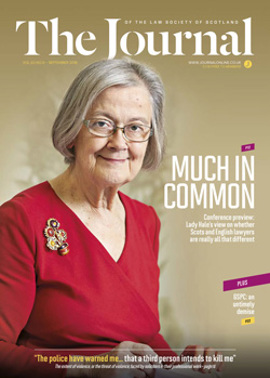Practice rights and the impact of Brexit: working in the EU

The extent of the impact of Brexit on Scottish practitioners will depend on the relevant practice area and situation of the individual involved. The information set out in this update is important, and if you have the opportunity to requalify through any of the routes explained, it is recommended to take action now if you have not already done so.
The current situation
With 29 March 2019 now only six months away, and reports of the risk of the UK leaving the EU without a withdrawal agreement in place on the rise, it is vital that where possible, Scottish solicitors with a strong EU dimension to their practice take action without further delay to secure their practice rights in the EU. Unfortunately, this will only be possible for Scottish solicitors already working in another European member state, or those willing to take exams before Brexit, and this article will highlight the ways in which it can be done. A follow-up article will explain the current position on practice rights and the potential impact of Brexit on Scottish solicitors working in the UK.
Option 1: establishment
For Scottish solicitors practising in another EU member state who have registered with their host bar, you are advised to trigger the administrative process for requalification in your host member state by way of assimilation, as set out in article 10 of the Establishment Directive (98/5/EC) as soon as possible. You should be able to retain your Scottish practising certificate while also becoming a fully recognised member of your host bar.
Duration and deadlines
If the UK leaves without a withdrawal agreement on 29 March 2019, this route will only be possible for candidates who will have completed the necessary three years of practice in the host member state by that deadline. The nature of such practice can be either or both host national law and EU law.
If the UK agrees a withdrawal agreement with the EU, that deadline will be extended to 31 December 2020 in line with the provisions contained in the agreement on the transitional period following the UK’s departure, meaning that solicitors who registered with their local bar before 31 December 2017 will be eligible to have their rights grandfathered. However, whether a transition period is achievable is not yet clear.
For the avoidance of doubt, establishment is unfortunately no longer a viable route for anyone planning to relocate to another EU member state before the UK leaves the EU (unless the transition period is potentially further extended).
Limitations on freedom of movement and EU citizenship
When free movement comes to an end following Brexit, this means that an EU qualification achieved by rights of establishment will not guarantee unfettered practice rights throughout the EU post-Brexit, as it currently allows. Therefore, if, for example, you have requalified as a French avocat before the UK leaves the EU, your loss of free movement rights thereafter will mean that you would only be able to practise as an avocat in France, advising on French and EU law, but unable to move and assert establishment rights in other member states after Brexit.
To be able to maintain the freedom of movement between member states and EU jurisdictions currently enjoyed as an EU lawyer, you would also need to become a citizen of an EU member state. If this is an option that is open to you, it is something you need to consider seriously and act on quickly, due to the potential complexities involved after Brexit.
Option 2: examination
Under the Mutual Recognition of Professional Qualifications Directive, EU lawyers can requalify in another member state by way of EU examination without the three year practice period required under the establishment route.
Duration and deadlines
If the UK leaves the EU without a withdrawal agreement on 29 March 2019, you will need to have passed the relevant EU member state legal practice exams before this date. You would therefore need to make immediate enquiries to find out if this would be possible, and what the requirements are.
Where the UK agrees a withdrawal agreement with the EU, that will extend the period in which you would be eligible to sit the exams until 31 December 2020. However, as highlighted above, whether a transition period is achievable is not yet clear.
Limitations on freedom of movement and EU citizenship
The same limitations apply as set out under Option 1: establishment. Essentially, you will be limited to practising national law and EU law in your member state of requalification following Brexit, and can only move to practise in another member state on the basis of EU citizenship, or undertaking further examination (in line with the bar in question’s policy and practice, likely in relation to non-EU third-country candidates).
Take action now, and coming up next
The UK’s departure from the EU will have an impact on Scottish solicitors both at home and working in other European member states. The EU’s bottom line is that the four freedoms are indivisible, while the UK’s is that freedom of movement will come to an end. Consequently, the UK Government’s white paper on the future relationship necessarily envisions a future where we are outside the single market, even if we will end up largely abiding by the rules that govern it.
Over the coming months we will examine various areas in turn and provide further advice and information on how to manage the effects of Brexit on your practice. In our next article we will address the current position on practice rights and the potential impact of Brexit for Scottish lawyers working in the UK, and explain what the Society has been doing to represent your interests in this area. We will also be publishing an update as soon as the UK Government releases its upcoming technical paper on the practising rights of UK solicitors following Brexit, expected in the coming weeks.
In this issue
- Confidence restored: internal investigations and legal privilege
- Court reforms: still an unknown quantity
- Ruled out of court?
- Uncovering the environment (1)
- Medical death: a case to answer
- Reading for pleasure
- Opinion: Kerry Trewern and Rhona McNair
- Book reviews
- Profile: Ryan McCuaig
- President's column
- Developing digital services
- People on the move
- Leading judgment
- Health check
- Open to attack
- Claims: beating the trigger
- Storage: time for digital
- GSPC: eulogy for a friend
- Relevant persons: a challenge
- New specialist land registration practice launches
- Good enough reason?
- Copyright: underpinning control
- Writing means writing
- Rent moves: two crucial hoops
- Debtor wins in policy decision
- Scottish Solicitors' Discipline Tribunal
- KIR: the time bomb explodes
- The guideline goal
- GC NextGen: a network for you?
- Your Law Society of Scotland Council members
- Public policy highlights
- Double boost for Society's AML team
- Ask Ash
- Practice rights and the impact of Brexit: working in the EU
- Acting as notary: what do I need to know?
- Engagement letters: a practical approach
- Uncovering the environment
- Paralegal pointers






